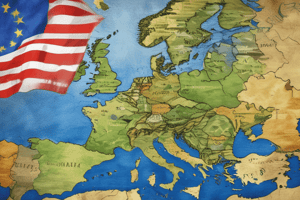Podcast
Questions and Answers
What has been a criticism of the EU's handling of nationalist sentiments?
What has been a criticism of the EU's handling of nationalist sentiments?
- It has strengthened democratic institutions and the rule of law
- It has encouraged dialogue and compromise between member states
- It has ignored national concerns and imposed EU policies (correct)
- It has promoted a sense of European identity that supersedes national identities
What is a common cause of ethnic conflicts in Europe?
What is a common cause of ethnic conflicts in Europe?
- The rise of fascist regimes in Europe
- Historical grievances and competing national narratives (correct)
- The promotion of European identity over national identities
- Economic and political marginalization of minority groups
What was a consequence of imperialism and colonialism in Europe?
What was a consequence of imperialism and colonialism in Europe?
- The rise of nationalist movements in colonized countries (correct)
- The promotion of European identity over national identities
- The strengthening of democratic institutions in Europe
- The emergence of fascist regimes in Europe
What is a factor that influences national identity formation?
What is a factor that influences national identity formation?
What was a characteristic of fascist regimes in Europe during the interwar period?
What was a characteristic of fascist regimes in Europe during the interwar period?
What was a consequence of the rise of fascist regimes in Europe?
What was a consequence of the rise of fascist regimes in Europe?
What has been a response of the EU to nationalism?
What has been a response of the EU to nationalism?
What was a historical event that contributed to the rise of nationalist sentiments in Europe?
What was a historical event that contributed to the rise of nationalist sentiments in Europe?
Which type of labor is most likely to require education and training to perform their job?
Which type of labor is most likely to require education and training to perform their job?
What is a characteristic of non-renewable natural resources?
What is a characteristic of non-renewable natural resources?
What is a goal of resource management?
What is a goal of resource management?
What is a key factor in soil formation?
What is a key factor in soil formation?
What is a major concern related to land degradation in India?
What is a major concern related to land degradation in India?
What is a strategy for resource planning in India?
What is a strategy for resource planning in India?
What is the primary characteristic of clay soil?
What is the primary characteristic of clay soil?
Which of the following is a consequence of land degradation?
Which of the following is a consequence of land degradation?
What is the primary goal of resource planning in India?
What is the primary goal of resource planning in India?
Which of the following is a type of soil with balanced water-holding capacity and drainage?
Which of the following is a type of soil with balanced water-holding capacity and drainage?
What is a strategy for resource planning in India?
What is a strategy for resource planning in India?
What is a cause of land degradation?
What is a cause of land degradation?
Flashcards are hidden until you start studying
Study Notes
Nationalism in Europe
European Union's Response to Nationalism
- The EU has been criticized for its handling of nationalist sentiments, with some arguing it has fueled nationalism by:
- Ignoring national concerns and imposing EU policies
- Failing to address economic and social disparities between member states
- Encouraging a sense of European identity that supersedes national identities
- The EU has responded to nationalism by:
- Promoting EU-wide policies to address common challenges (e.g., migration, security)
- Strengthening democratic institutions and the rule of law
- Encouraging dialogue and compromise between member states
Imperialism and Colonialism
- Historical roots of nationalism in Europe:
- Imperialism and colonialism led to the rise of nationalist movements in colonized countries
- European powers exploited and suppressed local cultures, leading to resentment and demands for independence
- Nationalist ideologies emerged as a response to foreign domination and cultural erasure
- Legacy of imperialism and colonialism:
- Continued economic and political disparities between former colonizers and colonized countries
- Ongoing struggles for national identity and self-determination in post-colonial states
Ethnic Conflicts
- Ethnic conflicts in Europe:
- Yugoslav Wars (1990s): nationalist tensions between ethnic groups led to violent conflict
- Basque and Catalan separatism in Spain: ongoing demands for independence and self-governance
- Northern Ireland: sectarian tensions between Protestant and Catholic communities
- Causes of ethnic conflicts:
- Historical grievances and competing national narratives
- Economic and political marginalization of minority groups
- Failure to address and accommodate ethnic diversity
National Identity Formation
- National identity formation:
- Process of creating a shared sense of identity and belonging among a group of people
- Often tied to a shared history, language, culture, and territory
- Can be inclusive or exclusive, leading to varying degrees of nationalist sentiment
- Factors influencing national identity formation:
- Historical events and experiences
- Cultural and linguistic heritage
- Political and economic interests
Rise of Fascist Regimes
- Interwar period (1918-1939): rise of fascist regimes in Europe:
- Italy: Benito Mussolini's fascist regime
- Germany: Adolf Hitler's Nazi regime
- Spain: Francisco Franco's authoritarian regime
- Characteristics of fascist regimes:
- Authoritarian leadership and suppression of opposition
- Nationalist and militaristic ideologies
- Aggressive expansionism and imperialism
- Consequences of fascist regimes:
- World War II and the Holocaust
- Destruction of democratic institutions and human rights
- Long-term impact on European politics and society
Nationalism in Europe
EU's Response to Nationalism
- EU criticized for ignoring national concerns and imposing EU policies
- EU failed to address economic and social disparities between member states
- EU encouraged a sense of European identity that supersedes national identities
- EU responded by promoting EU-wide policies to address common challenges
- EU strengthened democratic institutions and the rule of law
- EU encouraged dialogue and compromise between member states
Imperialism and Colonialism
- Imperialism and colonialism led to the rise of nationalist movements in colonized countries
- European powers exploited and suppressed local cultures, leading to resentment and demands for independence
- Nationalist ideologies emerged as a response to foreign domination and cultural erasure
- Continued economic and political disparities between former colonizers and colonized countries
- Ongoing struggles for national identity and self-determination in post-colonial states
Ethnic Conflicts
- Yugoslav Wars (1990s) resulted from nationalist tensions between ethnic groups
- Basque and Catalan separatism in Spain due to demands for independence and self-governance
- Sectarian tensions between Protestant and Catholic communities in Northern Ireland
- Historical grievances and competing national narratives cause ethnic conflicts
- Economic and political marginalization of minority groups contributes to ethnic conflicts
- Failure to address and accommodate ethnic diversity leads to ethnic conflicts
National Identity Formation
- National identity formation involves creating a shared sense of identity and belonging
- Often tied to a shared history, language, culture, and territory
- Can be inclusive or exclusive, leading to varying degrees of nationalist sentiment
- Historical events and experiences influence national identity formation
- Cultural and linguistic heritage impacts national identity formation
- Political and economic interests shape national identity formation
Rise of Fascist Regimes
- Interwar period (1918-1939) saw the rise of fascist regimes in Italy, Germany, and Spain
- Benito Mussolini's fascist regime in Italy
- Adolf Hitler's Nazi regime in Germany
- Francisco Franco's authoritarian regime in Spain
- Authoritarian leadership and suppression of opposition characterize fascist regimes
- Nationalist and militaristic ideologies define fascist regimes
- Aggressive expansionism and imperialism are consequences of fascist regimes
- World War II and the Holocaust resulted from fascist regimes
- Destruction of democratic institutions and human rights occurred under fascist regimes
- Long-term impact on European politics and society was significant
Human Resources
- Human resources are the skills, abilities, and expertise of individuals that contribute to productivity and efficiency in an organization or economy.
- They are essential for economic growth and development, innovation, and competitiveness.
- They enhance organizational performance and productivity.
- Types of human resources include skilled labor (e.g., professionals, technicians), unskilled labor (e.g., manual workers), and semi-skilled labor (e.g., clerks, salespersons).
- Human resource development involves education and training, health and wellness, and social welfare and benefits.
Natural Resources
- Natural resources are naturally occurring substances or materials used for economic gain or to support life.
- They are essential for human survival and economic development, and support biodiversity and ecosystem health.
- They can be depleted or degraded if not managed sustainably.
- Types of natural resources include renewable resources (e.g., sunlight, water, wind) and non-renewable resources (e.g., fossil fuels, minerals).
Resource Management
- Resource management involves planning, organization, and supervision of resources to achieve efficient and effective use.
- Goals of resource management include optimizing resource utilization, minimizing waste and pollution, and ensuring sustainability.
- Strategies for resource management include conservation and preservation, efficient use and allocation, and recycling and reuse.
Soil and its Types
- Soil is a naturally occurring mixture of mineral and organic components that support plant growth.
- Types of soil include clay soil (high water-holding capacity, poor drainage), sandy soil (low water-holding capacity, good drainage), loamy soil (balanced water-holding capacity and drainage), and silt soil (medium water-holding capacity, moderate drainage).
- Soil is important for supporting plant growth and agriculture, filtering and regulating water, and storing carbon and nutrients.
Land Degradation
- Land degradation is the decline in the quality and productivity of land due to human activities or natural processes.
- Causes of land degradation include deforestation and land clearance, soil erosion and salinization, and overgrazing and mining.
- Effects of land degradation include loss of biodiversity and ecosystem services, decreased agricultural productivity, and increased poverty and migration.
Resource Planning in India
- Resource planning is important for ensuring sustainable development and growth, managing natural resources effectively, and supporting poverty reduction and social welfare.
- Strategies for resource planning in India include integrated resource management plans, decentralized decision-making and community involvement, and public-private partnerships and investments.
- Initiatives for resource planning in India include the National Resource Management Policy, Sustainable Development Goals (SDGs), and state-level resource management plans and programs.
Studying That Suits You
Use AI to generate personalized quizzes and flashcards to suit your learning preferences.




